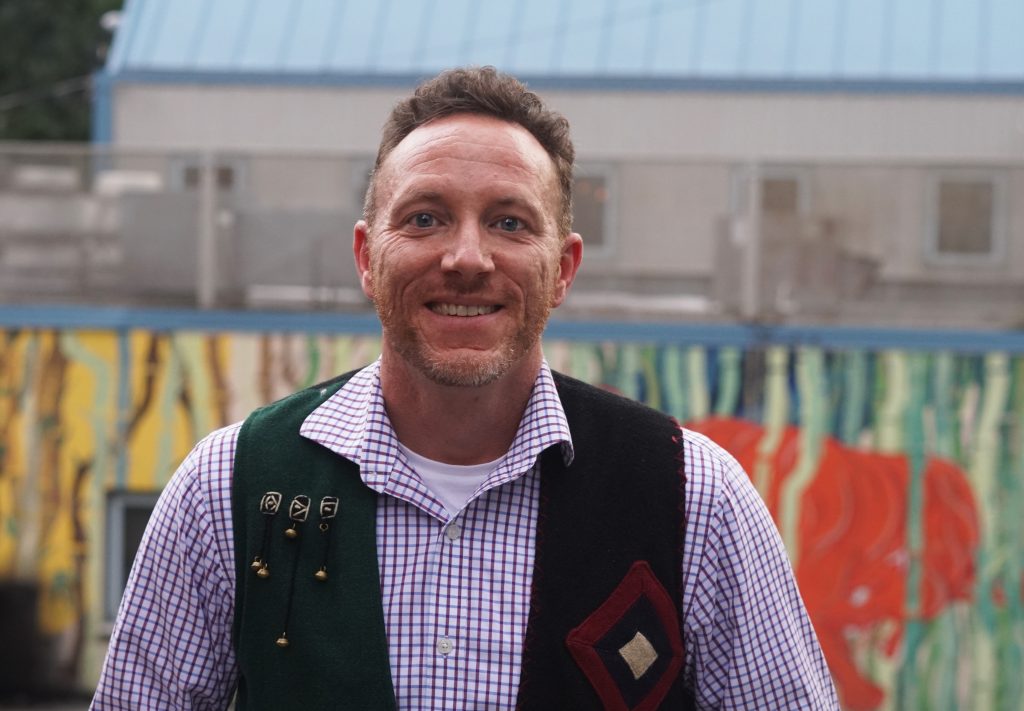Ploughshares: Pastor and SIT alum Scott Couper’s African journey
November 5th, 2018 | Africa, Alumni, SIT Study Abroad

Listen to Scott Couper’s tales of his voyage from student days to career, and you feel more like you’re talking to an adventurer than to the pastor of a small-town Vermont Congregational church. Maybe it’s the lack of a suit and tie, or the upwellings of restlessness in his mostly calm demeanor. No matter what the tell is, Scott’s story reveals an abiding love of adventure and of Africa. SIT is central to his voyage.
He first visited Africa in 1993, as part of an SIT Study Abroad program in Nigeria focusing on culture and economics. He found the fast pace of the capital city, Lagos, exhilarating. “It was organized chaos, and I loved it. It was saturated with intensity. The culture was intense; the fashion was intense; the climate was intense. Even the pollution was intense,” Scott says. “Nigeria was amazing. I went back twice after the program ended.”
Scott didn’t want to leave Africa, so he found a way to stick around — he got accepted into another SIT program. This one was in Zimbabwe, and focused on grassroots movements and NGO management. There, he ended up taking on a highly unusual Independent Study Project (ISP).
It was a difficult time in Zimbabwe. The country was suffering from a drought and had gone through a war in the 1980s. In his homestay region, an industry sprang up around scavenging metal from the vehicles damaged in the war. He studied that new industry for his ISP. “After we scavenged metal, we’d melt the stuff down and turn it into farming implements,” Scott says. “It was literally ‘swords into ploughshares.’”
During his first extended stay in Africa, Scott pursued work as a missionary through the Congregational church. The church, he says, wasn’t all that interested in an independent operator who wanted to do his own thing, sans training or direction. “I was a bit arrogant and narcissistic. I wrote back to the church and told them, ‘If you don’t find something for me, I will show up and do my own thing anyway.’”
With that, the church gave in and agreed to work with him. It was the start of a long career. After he finally returned to the States to finish his degree in international relations, he went right back to Africa on behalf of the church. “I monitored human rights abuses in Kingdom of Lesotho, primarily things happening around the second Lesotho Highlands [hydropower] project.”
Scott then came back to the US, studying for three years in Chicago to become a Congregational minister. He immediately headed back to Africa, now as an official, ordained missionary. “In South Africa, I was a pastor, and I also worked in KwaZulu-Natal province, helping with HIV/AIDS relief.” Eventually, Scott juggled several positions simultaneously, founding a local history museum and teaching at a Methodist seminary and the University of KwaZulu-Natal.
For the last few years of his sojourn, Scott also worked for SIT Study Abroad as an academic coordinator in South Africa. It was a role he was singularly suited for, he says, as a longtime American resident of South Africa, an academic, and even as a pastor. In addition to logistics and more purely academic duties, Scott says, “I could help out if people felt anxious. I could be a pastoral presence, and even do some counseling if I needed to.”
When he decided to return to the States after 18 years in South Africa, Scott, curious about SIT’s home location, looked into Vermont and found a couple of openings for pastors. Before long, he was hired to come to Centre Congregational Church in Brattleboro.
One thing, he says, really sticks out about SIT, and is part of why he keeps finding himself in its orbit. It’s something he noted as a student and as an employee. “The degree to which SIT balances risk with safety cannot be done any better. It’s so easy to go overboard with one or the other — if you try to cocoon students, they will learn nothing. If you allow them to experience a free-for-all, they can quickly get themselves into trouble. But SIT really balances the two as perfectly and fruitfully as a program can.”
